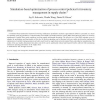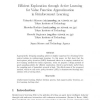509 search results - page 20 / 102 » Using Learning for Approximation in Stochastic Processes |
116
click to vote
ATAL
2007
Springer
15 years 8 months ago
2007
Springer
Reinforcement learning promises a generic method for adapting agents to arbitrary tasks in arbitrary stochastic environments, but applying it to new real-world problems remains di...
129
click to vote
AUTOMATICA
2006
15 years 2 months ago
2006
A simulation-based optimization framework involving simultaneous perturbation stochastic approximation (SPSA) is presented as a means for optimally specifying parameters of intern...
123
click to vote
ICML
2010
IEEE
15 years 3 months ago
2010
IEEE
Restricted Boltzmann machines were developed using binary stochastic hidden units. These can be generalized by replacing each binary unit by an infinite number of copies that all ...
139
click to vote
NN
2010
Springer
14 years 9 months ago
2010
Springer
Appropriately designing sampling policies is highly important for obtaining better control policies in reinforcement learning. In this paper, we first show that the least-squares ...
118
click to vote
CDC
2010
IEEE
14 years 9 months ago
2010
IEEE
Abstract-- We consider reinforcement learning, and in particular, the Q-learning algorithm in large state and action spaces. In order to cope with the size of the spaces, a functio...


